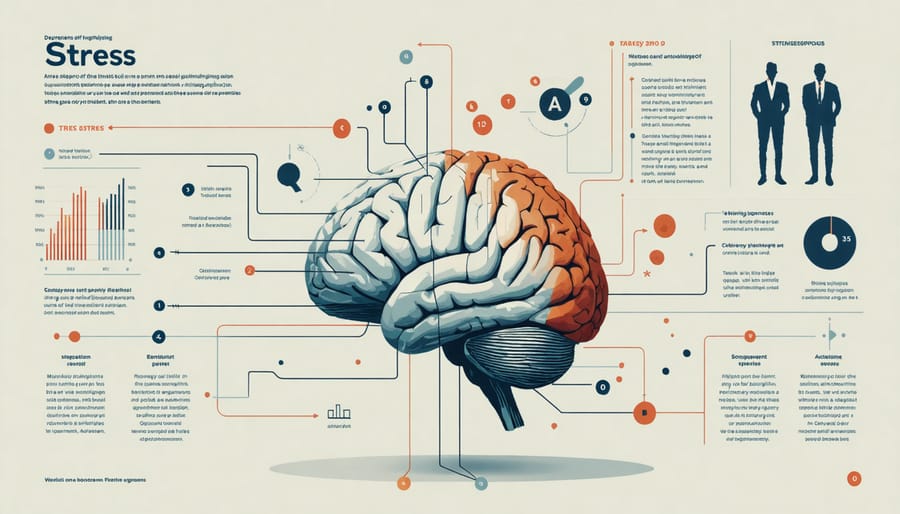Build emotional resilience by starting each day with a five-minute self-reflection practice, focusing on what you can control and accepting what you can’t. This simple yet powerful habit creates a foundation for stronger emotional responses to life’s challenges.
Life’s setbacks don’t have to break you. Whether facing workplace stress, relationship difficulties, or health concerns, emotional resilience acts as your psychological armor, protecting your mental wellbeing while helping you bounce back stronger. Research shows that resilient individuals not only handle stress better but also experience improved physical health, stronger relationships, and greater career success.
The good news? Emotional resilience isn’t fixed – it’s a skill you can develop, just like building physical strength. Through proven techniques and consistent practice, anyone can enhance their ability to navigate life’s ups and downs with greater confidence and clarity. In Alberta’s challenging climate, where long winters and economic fluctuations can impact mental health, building emotional resilience becomes especially crucial for maintaining long-term wellbeing.
Let’s explore practical strategies that go beyond basic stress management, helping you develop the inner strength needed to thrive in today’s complex world.
Why Your Mental Strength Matters for Physical Health
The Stress-Health Connection
When left unchecked, chronic stress impacts physical health in ways many Albertans might not realize. Your body’s stress response triggers a cascade of hormones that, while helpful in short bursts, can wear down your systems over time. Think of it like keeping your car engine constantly revving – eventually, something’s bound to give.
This ongoing stress can lead to increased blood pressure, weakened immune function, and disrupted sleep patterns. It might show up as frequent headaches, muscle tension, or digestive issues. For many of us juggling work and family life in Alberta’s fast-paced environment, these symptoms might seem normal – but they’re your body’s way of raising red flags.
The good news? Understanding this connection between stress and health is your first step toward positive change. By recognizing how stress affects your body, you can take meaningful action to protect your health. This awareness helps you spot early warning signs and implement stress-management strategies before serious health issues develop.

Your Body’s Response to Emotional Challenges
When emotional challenges arise, your body often responds in noticeable ways. You might experience a racing heart, tight chest, or sweaty palms during stressful situations. These physical reactions are your body’s natural response to emotional stress, but when they become frequent, they can affect your overall well-being.
Poor emotional resilience can manifest as ongoing digestive issues, frequent headaches, or disrupted sleep patterns. Many Albertans report experiencing muscle tension, particularly in their shoulders and neck, when dealing with prolonged stress. These physical symptoms often create a cycle – the more stressed you feel, the more your body reacts, which in turn can increase your emotional distress.
Your immune system can also take a hit when you’re emotionally overwhelmed. This may leave you more susceptible to common colds and infections, especially during our harsh Alberta winters. Some people notice changes in their appetite or energy levels, while others might experience skin issues or unexplained aches and pains.
Recognizing these physical signs is the first step toward building better emotional resilience. Think of them as your body’s way of signaling that it’s time to implement some coping strategies.
Daily Habits That Build Mental Toughness
Mindful Movement Practices
Physical movement is a powerful tool for building emotional resilience, and incorporating mindful movement practices into your daily routine can significantly impact your emotional well-being. Here in Alberta, we have countless opportunities to engage in movement-based activities that strengthen both body and mind.
Start with gentle stretching or yoga, focusing on the connection between your breath and movement. Even a 10-minute morning routine can set a positive tone for your day. Walking meditation, particularly popular in our beautiful provincial parks, combines physical activity with mindfulness – simply focus on each step, the rhythm of your breathing, and the natural surroundings.
Tai Chi and Qigong classes are widely available in community centers across Alberta, offering structured approaches to mindful movement. These practices help regulate emotions while improving balance and flexibility. For those who prefer more vigorous activity, mindful running or swimming can serve as moving meditation – pay attention to your body’s sensations and the natural flow of movement.
Remember to start slowly and choose activities that feel comfortable for you. Many local recreation centers offer introductory classes specifically designed for beginners. The goal isn’t perfection but rather developing a consistent practice that helps you stay grounded and emotionally balanced through physical awareness.

Stress-Smart Eating Patterns
What you eat plays a crucial role in how well you handle stress and maintain emotional balance. Start by establishing regular meal times – this helps stabilize blood sugar levels, which directly affects mood and energy. Include protein-rich foods like eggs, lean meats, and legumes in every meal to support steady energy release throughout the day.
Complex carbohydrates found in whole grains, sweet potatoes, and quinoa boost serotonin production, helping you feel calmer and more balanced. Don’t forget to include omega-3 rich foods like salmon, walnuts, and flax seeds, which support brain health and emotional regulation.
Albertans can take advantage of locally grown foods that support emotional resilience. Look for seasonal berries in summer, which are packed with antioxidants that help combat stress-related inflammation. Local root vegetables available year-round provide essential minerals that support nervous system function.
Limit or avoid emotional eating triggers like excessive caffeine, alcohol, and refined sugars. Instead, keep healthy snacks readily available – try mixing Alberta-grown nuts with dried fruits for a quick mood-supporting boost.
Remember to stay hydrated – even mild dehydration can affect your mood and ability to cope with stress. Consider starting your day with a warm cup of caffeine-free tea, which can become a calming ritual while supporting your body’s needs.
Mental Training Exercises
Just like exercising your muscles, strengthening your mind requires consistent practice. Here are several effective mental training exercises you can incorporate into your daily routine to build emotional resilience:
Practice the 5-4-3-2-1 grounding technique when feeling overwhelmed. Name five things you can see, four things you can touch, three things you can hear, two things you can smell, and one thing you can taste. This exercise helps anchor you to the present moment and reduces anxiety.
Try the “resilience reframe” exercise. When facing a challenge, pause and ask yourself: “What can I learn from this?” and “How might this help me grow?” This shifts your perspective from seeing obstacles as threats to viewing them as opportunities.
Develop a daily gratitude practice. Each evening, write down three specific things that went well during your day. This trains your brain to notice positive experiences, even during difficult times.
Practice emotional awareness through “weather reporting.” Throughout the day, check in with yourself and describe your emotional state as if it were weather: “I’m feeling cloudy with chances of anxiety” or “There’s a calm sunshine in my mind.” This builds emotional vocabulary and self-awareness.
Start with just five minutes daily and gradually increase your practice time. Remember, consistency matters more than duration when building mental strength.
Building Your Support System in Alberta
Professional Support Options
Alberta offers numerous professional support options to help you strengthen your emotional resilience. Mental health resources in Alberta include both public and private services designed to meet diverse needs and circumstances.
Access Mental Health (310-1321) serves as your first point of contact, offering free consultations and connecting you with appropriate support services. Through Alberta Health Services, you can access counseling services, group therapy sessions, and specialized programs focused on building emotional resilience.
Primary care networks across the province provide access to mental health professionals, often at no cost. Many offer workshops and programs specifically designed for stress management and emotional wellness.
For immediate support, the Mental Health Help Line (1-877-303-2642) operates 24/7, providing crisis intervention and connecting you with local resources. Additionally, many workplaces offer Employee Assistance Programs (EAPs) that include confidential counseling services.
Private practitioners, including psychologists and counselors, are available throughout Alberta’s major cities and rural areas. Many offer sliding scale fees and virtual sessions to ensure accessibility. Remember, seeking professional help isn’t a sign of weakness – it’s a proactive step toward building stronger emotional resilience.
Consider joining support groups in your community, which combine professional guidance with peer support, creating a comprehensive approach to emotional wellness.

Community Connection Strategies
Building a strong social support network in your local community is essential for emotional resilience. Here in Alberta, we’re fortunate to have numerous opportunities to connect with others and create meaningful relationships. Start by joining community groups that align with your interests – whether it’s a local hiking club, book club, or volunteer organization.
Consider reaching out to your neighborhood association or community league. These organizations often host events and activities that bring residents together, from farmers’ markets to seasonal festivals. Many Alberta communities also offer adult recreational sports leagues, which provide both social connection and physical activity benefits.
Local libraries and community centers are excellent hubs for meeting like-minded individuals. They frequently organize workshops, discussion groups, and cultural events that can help you expand your social circle. For those who prefer smaller gatherings, consider starting a regular coffee meet-up with neighbors or joining a local faith community.
Don’t overlook workplace connections either. Many Alberta businesses encourage team-building activities and social events. Take advantage of these opportunities to build relationships beyond just professional interactions.
Remember that building community connections takes time and effort. Start small by committing to one or two regular social activities, and gradually expand your involvement as you feel comfortable. The key is to create genuine, sustainable relationships that can provide support during challenging times and celebrate with you during good ones.
When to Seek Additional Help
While building emotional resilience is a journey many can navigate independently, there are times when seeking professional support is not just helpful but necessary. If you’re experiencing persistent feelings of being overwhelmed, having difficulty sleeping, or notice significant changes in your eating habits, these may be signs that additional support could benefit you.
Pay attention if you find yourself withdrawing from social connections, feeling unable to perform daily tasks, or if your emotional responses seem disproportionate to situations. These could indicate that your current coping strategies need reinforcement from a mental health professional.
In Alberta, several pathways to professional support are available. Start by consulting your family doctor, who can provide an initial assessment and referral to appropriate mental health services. Alberta Health Services offers mental health helplines available 24/7, and many communities have walk-in counselling services with sliding-scale fees.
Through your employer, you might have access to an Employee Assistance Program (EAP) that provides confidential counselling services. Many local organizations also offer group support programs, which can be both therapeutic and educational.
Remember, seeking help is not a sign of weakness but rather a demonstration of self-awareness and strength. Professional support can provide you with additional tools and strategies to build your emotional resilience more effectively.
If you’re unsure where to start, contact Alberta’s Mental Health Helpline at 1-877-303-2642. They can connect you with resources in your specific community and help determine the most appropriate type of support for your situation.
For immediate crisis support, always remember that help is available 24/7 through local crisis lines and emergency services. Taking this step to seek additional support can be a crucial turning point in strengthening your emotional resilience journey.
Building emotional resilience is a journey that requires dedication, practice, and patience. As we’ve explored throughout this article, strengthening your emotional resilience isn’t just about handling stress better – it’s about creating a more fulfilling and balanced life for yourself and those around you.
Remember that small steps lead to significant changes. Start by incorporating one or two strategies we’ve discussed into your daily routine, whether it’s practicing mindfulness, reaching out to your support network, or reframing challenging situations. As these practices become habits, you can gradually add more tools to your emotional resilience toolkit.
Here in Alberta, we’re fortunate to have access to numerous community resources and support systems. Don’t hesitate to reach out to local mental health professionals, join community groups, or participate in wellness programs. Your journey toward greater emotional resilience doesn’t have to be a solitary one.
Most importantly, be patient and kind with yourself as you develop these skills. Some days will be easier than others, and that’s perfectly normal. Celebrate your progress, learn from setbacks, and keep moving forward. By investing in your emotional resilience today, you’re building a stronger foundation for handling life’s challenges tomorrow.
Take that first step today. Your future self will thank you for starting this important work now.

